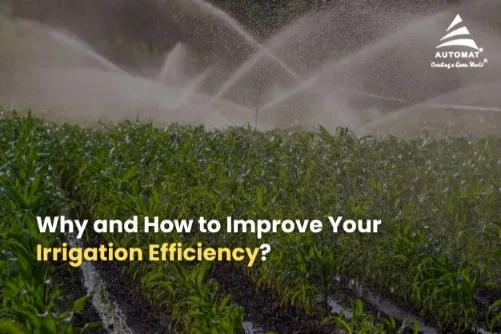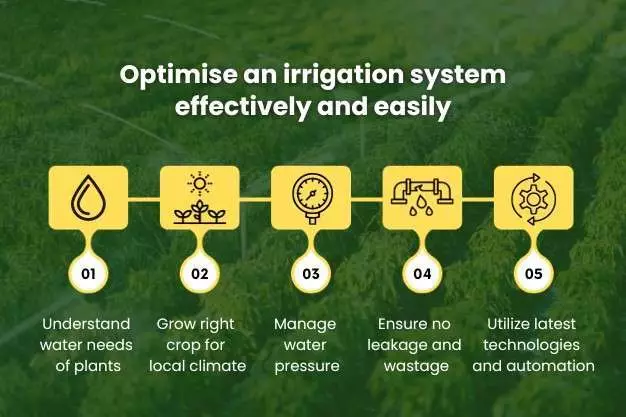
Water, the key element for humanity to survive and flourish, is today a very scarce commodity, mainly due to rampant wastage, deforestation and climate change. It is the source of life on our planet and the single most essential resource for agriculture which consumes over 70 percent of the naturally available fresh water. Unfortunately, the availability of water is not endless and many regions today suffer from an acute shortage. Over 1/5 of the world’s population lives under severe water constraints, and this percentage is increasing yearly.
For agriculture, the lack of this precious resource is a threat, and its productivity is directly dependent on water. Therefore, it is vital to properly utilise this resource, prevent water erosion and reduce consumption where possible.
Irrigation is an essential component of agriculture, landscaping, and horticulture. Irrigation management emphasizes the application of the right amount of water at the right time and in the right way based on plant needs with an overall goal of promoting plant growth and development while reducing water wastage and associated costs.

Irrigation management is critical for optimizing the performance of irrigation systems, reducing water usage, and improving plant health. Although it could be challenging to optimize an irrigation system, but by doing the following steps it can be done:
-
-
- Understanding plants’ water needs, and growing the right crop for the local climate
- Managing water pressure, by ensure no leakage and wastage
- Utilizing the latest technologies and automation e.g rain sensors etc.
-
Farmers and landscapers can improve irrigation efficiency, conserve water resources, and save money/costs by implementing these strategies, which may require an upfront investment, but the long-term benefits outweigh the investment. Therefore, adopting these strategies will not only make your irrigation system sustainable but will also protect the environment and promote a healthier future for farming and landscaping.
Read More : How to efficiently irrigate your crops in summer and keep them healthy?
Indian farmers perpetually remain under various threats such as excess groundwater depletion, water salinization, variable climatic conditions leading to droughts, unusual or sudden heavy rains, and the inability to access water reserves.
Precision irrigation works is an apt solution to combat most of these concerns through appropriate and adequate planning and usage of water. This process aims at minimizing the use of water within the agricultural sector while continuing to maintain optimal crop productivity rates. Water (and energy) efficient irrigation also provides a number of environmental and socio-economic benefits.
Technological advances over the decades has helped in creating more efficient irrigation systems where water release can be controlled so that crops receive only the amount needed e.g. pressurized irrigation systems such as drip irrigation or other automated irrigation systems which are self-propelled and include wireless sensors and GPS technology to improve site-specific and volumetric precision of water applications to match the needs of the soil and crops.
Irrigation efficiency can also be improved through altering farming practices, such as crop rotation (plant crops according to seasons and soil conditions) and conservation tillage (leaving a previous year’s crop residue on the field to reduce soil erosion and runoff) that help improve soil moisture conservation.
Read More : Automatic Irrigation Systems – New technology awareness and its benefits to farmers
Regularly monitoring equipment and repairing damages/leakages in the irrigation systems are critical to improving water usage efficiency.
Improving access to information through farmer education programs, can help incentive and influence the behaviour of farmers toward greater water-efficient management of irrigation systems. In addition, operational and legislative changes, like the implementation of new water-rights laws, or creating incentives for efficient use, may also be effective in promoting irrigation efficiency.
Read More : How to increase your yield of the crop using sprinklers?
Agriculture sector is one of the primary consumer of water in the world and Proper irrigation is the key to a healthy crop and soil fertility, which is why it is essential to make the right choice.
CONCLUSION
In addition to the practices and strategies mentioned above, incorporating Saaras sprinkler into your irrigation system can take efficiency to the next level. Saaras enables precise and real-time management of your irrigation setup thus it is farmer’s most trusted sprinkler from last 12 years. Instalment of Saaras, can ensure a future of more sustainable irrigation practices, promoting uniform and smooth water distribution, providing healthier crops, and ultimately contributing to a more resilient and prosperous agricultural landscape.




